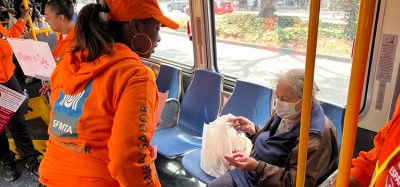Transport security: in training for the Olympics
- Like
- Digg
- Del
- Tumblr
- VKontakte
- Buffer
- Love This
- Odnoklassniki
- Meneame
- Blogger
- Amazon
- Yahoo Mail
- Gmail
- AOL
- Newsvine
- HackerNews
- Evernote
- MySpace
- Mail.ru
- Viadeo
- Line
- Comments
- Yummly
- SMS
- Viber
- Telegram
- Subscribe
- Skype
- Facebook Messenger
- Kakao
- LiveJournal
- Yammer
- Edgar
- Fintel
- Mix
- Instapaper
- Copy Link
Posted: 30 June 2009 | Steve Thomas, Assistant Chief Constable, British Transport Police (BTP) and Olympics National Coordinator for Cross-modal Transport Security | No comments yet
The Olympics are quite simply the world’s biggest event. In 2012, the London Olympics will involve 10,700 athletes from more than 200 nations, with 500,000 plus spectators daily, as well as 50,000 athletes, officials and media representatives. In addition, 2012 will be a ‘public transport’ games with almost 100% of spectators expected to use public transport to access the Olympic Park.
Transport security is then vital to the success of the Olympic and Paralympic Games and it is my task to co-ordinate it across all transport modes. I was appointed in July 2007 to head up British Transport Police’s (BTP) Olympics delivery project and soon after was named as National Co-ordinator for Cross-Modal Transport Security covering rail, road, maritime and air transport – a joint Department for Transport and Home Office appointment.
The Olympics are quite simply the world’s biggest event. In 2012, the London Olympics will involve 10,700 athletes from more than 200 nations, with 500,000 plus spectators daily, as well as 50,000 athletes, officials and media representatives. In addition, 2012 will be a ‘public transport’ games with almost 100% of spectators expected to use public transport to access the Olympic Park. Transport security is then vital to the success of the Olympic and Paralympic Games and it is my task to co-ordinate it across all transport modes. I was appointed in July 2007 to head up British Transport Police’s (BTP) Olympics delivery project and soon after was named as National Co-ordinator for Cross-Modal Transport Security covering rail, road, maritime and air transport – a joint Department for Transport and Home Office appointment.
The Olympics are quite simply the world’s biggest event. In 2012, the London Olympics will involve 10,700 athletes from more than 200 nations, with 500,000 plus spectators daily, as well as 50,000 athletes, officials and media representatives. In addition, 2012 will be a ‘public transport’ games with almost 100% of spectators expected to use public transport to access the Olympic Park.
Transport security is then vital to the success of the Olympic and Paralympic Games and it is my task to co-ordinate it across all transport modes. I was appointed in July 2007 to head up British Transport Police’s (BTP) Olympics delivery project and soon after was named as National Co-ordinator for Cross-Modal Transport Security covering rail, road, maritime and air transport – a joint Department for Transport and Home Office appointment.
I work within the Olympic Security Directorate (OSD), which brings together more than 25 partner agencies to provide safety, security and resilience, ensuring there is one overarching programme of activity to deliver security nationally for the Games. The OSD in turn sits within the UK’s Office of Security and Counter Terrorism (OSCT) and there is an Olympic Security Board, where key stakeholders including the Olympic Delivery Authority (ODA) and the London Organising Committee for the Olympic Games (LOCOG) are represented.
The acronym jungle reflects the complexity of relationships necessary to deliver a secure and successful Games, and on the transport side co-ordination and co-operation with transport providers is a further element we are working hard to make effective.
As the national co-ordinator for transport security, I report to two bodies – the Olympic Security Directorate Delivery Board and the Transport Security Steering Group. The latter is chaired by the Director of TRANSEC – the Transport Security and Contingencies Directorate of the Department for Transport.
The OSD and its deliverers, largely police forces in London and around the country, are working within a budgetary ‘envelope’ of £600 million, and within that transport security will account for about 10%. Over and above this specific Olympics budgetary provision, the Olympic security strategy is integrated with and draws on resources allocated under the Government’s counter-terrorism strategy, known as CONTEST, as well as other pre-existing security regimes, such as those governing transport networks.
The high level security strategy is in place and a ‘Concept of Operations’ has been developed to deliver security across Britain. It is important to remember that although 2012 is billed as the London Olympics, in fact there will be more than 30 venues across the country, from Scotland to Wales.
The Concept of Operations comprises five strands: ‘Prepare’, ‘Identify and Disrupt’, ‘Protect’, ‘Command, Control, Plan and Resource’ and ‘Engage’ – with transport security falling under the ‘Protect’ agenda – protecting venues, events, transport infrastructure and their users.
Policing of transport networks requires a different mindset from policing fixed geographical locations. Often, if you are dealing with an incident or crime scene, your first thought is to isolate it, establish a cordon, sanitise the area and begin the investigative or recovery process from there.
The effects of doing this on a transport network can under many circumstances be disastrous. Disruption can reverberate down the system causing more problems than the original incident. With the Olympics, this process is magnified as there will be zero tolerance for event delays, and so for disruption to transport from whatever source. The bid strategy also set out the need for a consistent look and feel to the games, as a celebration of sport, so we have to deliver policing and security within that context.
Police forces, and British Transport Police in particular, are used to dealing with large scale events and many of the venues are already in use, so we are not trying to re-invent the wheel. The types of operations and security arrangements that are put in place today, together with the skills profile of officers and staff, will be largely fit for purpose for the Olympics. I personally have experience with major events policing within London and Manchester, including the 2000 Commonwealth Games and the police operation on Millennium Eve for the opening of London’s Millennium Dome. I also have the experience of policing football across Europe to draw on, as the lead for the Association of Chief Police Officers in England and Wales on football policing, on whose behalf I have been involved in the 2006 World Championships and the European Championships of 2004 and 2008, as well as a number of Champions League finals.
With nine million tickets on sale, 7.7 million for the Olympics themselves and another 1.5 million for the Paralympics, and 80% of spectators arriving and departing by rail, the Olympics are a huge challenge. We also have to see them in the context of continuing business as usual, resourcing all those tasks and events that are not Olympics related. As well as the Olympic and Paralympic Games, in 2012 there will be a summer of celebrations including the Queen’s Jubilee, Euro 2012 and Olympic cultural events, in addition to the usual big occasions, such as the Notting Hill Carnival – itself one of the biggest policing operations in Europe.
A further difference during the Olympics is that there is a large international dimension, with a completely different audience that will have its own dynamics. People travelling may not be used to large crowds and will be travelling in very unfamiliar environments. These will not be like football supporters who, for the majority, are accessing a venue they are used to and comfortable with.
As with any form of transport policing, co-ordination with the transport providers is essential and we are already confident for London and the Olympic Park that we should have a good idea about travel patterns, as the ODA and LOCOG will provide recommended travel routes as part of ticketing arrangements.
The London Underground system will carry the bulk of passengers, and we are well used to dealing with crowded Tube services, but other services, such as the high-speed Javelin trains from St. Pancras International with an hourly capacity of 25,000, will also operate and at peak times trains will be arriving into the Olympic Park every 15 seconds.
The risk profile for our planning encompasses the issues police forces are dealing with on a daily basis and can be summed up as crime, disruption and terrorism. The strategy covers threats such as e-crime, fraud, terrorism, public order and displacement of crime and terrorism.
The UK national terrorism threat assessment is currently ‘Severe’, meaning that an attack is highly likely. We do not know where it will stand in three years time, but no-one realistically expects the threat from international terrorism to have abated completely. Indeed, the new manifestations of terrorist tactics are being monitored and fed into the planning process.
On the disruption front, there is a range of activities that could impact on service delivery for the transport system: the Olympics fill the screens of the world’s broadcasters so could clearly prove a tempting target for all manner of protest groups. The recent environmental and political protests around the G20 summit in London are indicative of the considerations which must be taken into account.
Non-malicious incidents – for instance the effects of a pandemic, a heatwave, or on the rail system, a simple non-suspicious fatality on the line – also have the potential to cause severe disruption. Part of our planning is around mitigation measures for such events.
Whilst airports can be, and are subject to, tight security regimes around identity checking, access and perimeter security, that sort of approach is not sustainable for an open mass transit system used by hundreds of thousands of people a day, so we look to different, layered approaches to securing networks.
A risk-based approach to security planning ensures that we remain flexible in order to be responsive to changing threats. Although studying transport security for the Beijing games has been of interest, the context there was very different and there are few transferable lessons.
Now, we have established the structures, strategy and relationships to deliver effective transport security for the Olympics, the various police forces and other agencies are turning their attention to the tactics and detail.
A significant proportion of the security budget will be spent on police operations and staff, with 10,000 police officers involved on the busiest days. Human resources issues, such as recruitment, skills audits, accommodation and logistics, are therefore high on the agenda.
Using proven technology is part of the strategy, but we need to ensure that it is fit for the demands that Olympics policing will bring. Work around the resilience of command and control and other systems is therefore under way, including a review of coverage of the Airwave Tetra radio system used by all police forces in Britain. The UK Government has already announced an increase in capacity for Airwave.
Related topics
Security & Crime
Issue
Issue 3 2009
Related organisations
British Transport Police (BTP)







